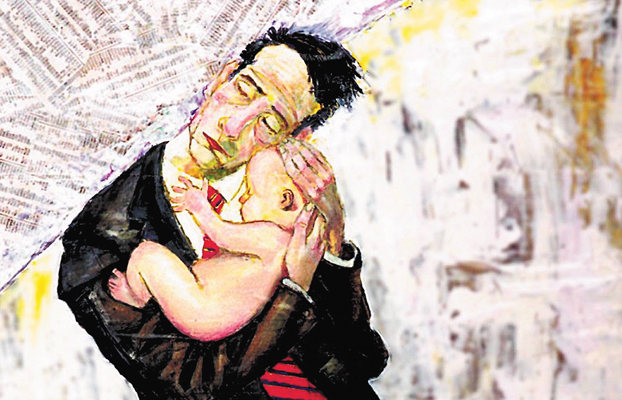o What: The Postpartum Father. Sam Stevens, licensed marriage and family therapist, will speak about paternal postpartum depression and anxiety. A panel of speakers will share their own experiences.
o When: 6:30 to 8:30 p.m. June 10.
o Where: TaborSpace, 5441 S.E. Belmont St., Portland.
o Cost: Free.
o Information: Baby Blues Connection
Postpartum depression isn’t a new condition, but it’s receiving new attention in the Portland-Vancouver area.
Only, the focus isn’t on new mothers. It’s on the fathers.
“It turns out, dads suffer from postpartum depression,” said Sam Stevens, a licensed marriage and family therapist in Portland.
“While they didn’t technically give birth, that doesn’t mean it isn’t really hard,” Stevens said. “It doesn’t mean they don’t get depressed.”
o What: The Postpartum Father. Sam Stevens, licensed marriage and family therapist, will speak about paternal postpartum depression and anxiety. A panel of speakers will share their own experiences.
o When: 6:30 to 8:30 p.m. June 10.
o Where: TaborSpace, 5441 S.E. Belmont St., Portland.
o Cost: Free.
o Information:Baby Blues Connection
Postpartum depression is defined as moderate to severe depression following the birth of a child. Even by definition, it’s not exclusive to mothers, Stevens said.
The precursors that make a person more likely to have postpartum depression are the same for women and men, Stevens said.
People who have a history of mental health difficulties, such as depression and anxiety, are more likely to experience those difficulties after a baby is born. In addition, people with poor social connections — feeling isolated and lacking support from family or friends — people who are facing other stressors — such as financial worries or marital problems — and people with demanding or colicky babies, are more likely to experience depression, Stevens said.
Having a spouse who is depressed also makes one more likely to become depressed. Research shows about 11 percent of men have postpartum depression, but 50 percent of men whose wives are depressed are depressed themselves, Stevens said.
About 15 to 20 percent of women experience postpartum depression and anxiety, he said.
Postpartum depression is different than “the baby blues,” Stevens said. Women with the baby blues feel weepy and emotional right after birth. Those symptoms are the result of the hormone crash after delivering a child and dissolve after a couple weeks, Stevens said.
Only recently has postpartum depression in men begun to receive attention from researchers, the medical field and the public, Stevens said. The condition has only been studied for the last 10 years or so, he said.
Cultural changes may be the reason for the new attention.
“Historically, dads were the provider and the protector, and that’s all they did,” Stevens said.
“Nowadays, we’re seeing that really shift,” he said.
Now, men face expectations to be a loving, caring and compassionate father and husband. Dads are also now fulfilling tasks that were once considered “mom roles,” Stevens said. They’re staying home and caring for babies while the mothers work. They’re pushing babies in strollers at the park. They’re toting babies to the grocery store.
“If you have a colicky baby and you’re getting up with your baby all night, if you’re having your wife depressed, you’re more likely to get depressed,” Stevens said.
The most common symptoms of paternal postpartum depression are irritability and withdrawing from family, friends or work. Men with postpartum depression may seem as though they’ve suddenly become a jerk — snapping at people and being grouchy, Stevens said. They may also spend less time at home or spend time at home alone and not interacting with the baby or other family members, he said.
Peter Reagan, a retired family physician, first recognized paternal postpartum depression when he was practicing a few years ago. He saw a new, stay-at-home dad who was feeling overwhelmed from caring for his 2-month-old. He felt like he was a bad person, that he couldn’t do anything right.
“It didn’t take long for me to say, ‘Gosh, this looks a lot like postpartum depression,'” Reagan said.
Reagan told his wife, Bonnie, about the visit. Bonnie Reagan, also a retired physician, was a volunteer with Baby Blues Connection, a nonprofit mom-to-mom support service for women in the Portland-Vancouver area. She saw the experience as an opportunity for the nonprofit to expand its offerings to include men, Reagan said.
From there, the nonprofit teamed up with Stevens to develop a new program in the metro area. They developed a monthly men’s support group in Portland and, earlier this year, they opened a 24-hour phone line for dads. They also hope to soon add another support group in Clark County. And this month, they’ll officially launch the dads program with a free community event to educate men and women about paternal postpartum depression.
“The culture is ready,” Reagan said. “It’s about time for somebody to think about dads because they’re being more like dads again and less like breadwinners.”
The goal, Stevens said, is to let men know they’re not alone, that others experience the same feelings, and offer support. They also hope to help men who are feeling overwhelmed and unprepared to set realistic expectations.
For the broader public, Stevens hopes the program will help reduce the stigma.
“Now we have a name for it,” Stevens said. “We’re trying to recognize that dads have these problems, too.”




